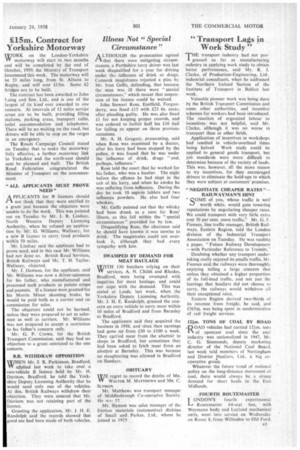"Transport Lags in Work Study"
Page 37

If you've noticed an error in this article please click here to report it so we can fix it.
THE transport industry had not progressed as far as manufacturing industry in applying work study to obtain better performance, said Mr. R. J. Clarke, of Production-Engineering, Ltd.. industrial consultants, when he addressed the Northern Ireland Section of the Institute of Transport in Belfast last week.
Valuable pioneer work was being done by the British Transport Commission and some other authorities, and incentive schemes for workers had been introduced. The reaction of organized labour to incentives was not helpful, said Mr. Clarke, although it was no worse in transport than in other fields.
Application of incentives in workshops had resulted in vehicle-overhaul times being halved. Work study could be applied to general goods transport, but job standards were more difficult to determine because of the variety of loads. This was, however, all the more reason to try incentives, for they encouraged drivers to eliminate the hold-ups to which they were subject at customers' premises.
"NEGOTIATE CHEAPER RATES" RAILWAYMAN'S HINT
" SOME of you, whose traffic is well worth while. would gain towering reputations by negotiating cheaper rates. We could transport with very little extra cost 30 per cent. more traffic," Mr. G. F. flumes, line traffic manager, British Railways, Eastern Region, told the London division of the industrial Transport Association on Tuesday. He was reading a paper, "Future Railway Development —with Particular Reference to Transits."
Doubting whether any transport undertaking really enjoyed its smalls traffic, Mr. Fiennes said the railways were thoroughly enjoying telling a large concern that unless they obtained a higher proportion of its full-load traffic, and not just the leavings that hauliers did not choose to carry, the railways would withdraw all their exceptional rates.
Eastern Region derived two-thirds of its revenue from freight, he said, and £365m. was being spent in modernization of rail freight services.
124m. TONS OF COAL BY ROAD
.ROAD D vehicles had carried 121m. tons 1 N. of opencast coal since the coa! industry was nationalized in 1947, Mr. C. G. Simmonds, deputy marketing director of the National Coal Board. last week told members of Nottingham and District Hauliers. Ltd., a big cooperative group.
Whatever the future trend of national policy on the long-distance movement of coal, there would always be a strong demand for short hauls in the East Midlands.
FOURTH ROUTEMASTER '
T ONDON'S fourth experimental
Routemaster 64-seat bus, with Weymann body and Leyland mechanical units, went into service on Wednesday on Route 8. from Willesden to Old Ford.




































































































